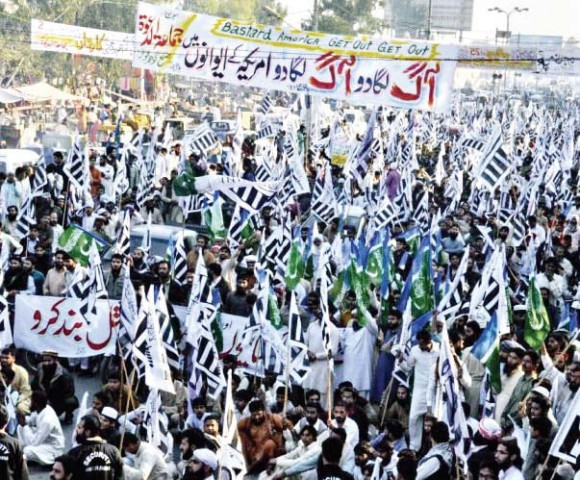Hurtling down the abyss
The recent Pakistan Defence Council rally in Lahore organised by some religious parties was ‘mammoth’.

It was the biggest Wahhabi-Deobandi gathering seen in a long while. The Barelvis were not there but Allama Tahirul Qadri of the Pakistan Awami Tehreek (PAT), speaking elsewhere in the country, asked the Supreme Court to get rid of the PPP government by forcing a midterm election held under a neutral caretaker government prescribed by the honourable court. The message to the military was: if the Nato supply routes are reopened, the jihadis will attack the trucks. Maulana Samiul Haq raised the rather grandiose slogan: “We will attack Indian, US, Russian and Nato forces if they try to violate Pakistan’s sovereignty”. JuD leader Hafiz Abdur Rehman Makki was more specific: “Our men are trained to use rifles and Kalashnikovs. When they head towards India with weapons, no one can resist them”. Sipah-e-Sahaba’s chief, Maulana Ahmad Ludhianvi, boasted that 4,000 young people he had sent for jihad had died.
This is the consequence of a number of vectors aligning themselves: the break between the US and Pakistan Army after the Salala attack; the consensus built by the PPP government in parliament in favour of the Pakistan Army against the US; the public mind as moulded by the media in favour of an isolationist policy under which jihad becomes possible; the memogate affair and the case related to it at the Supreme Court asking it to decide whether the PPP leadership was guilty of treason against the state by endangering its national security as represented by the Pakistan Army. Jihad, which has demonised Pakistan in the eyes of the world and given rise to proxy warriors gone haywire inside Pakistan after affiliating themselves with al Qaeda, is once again seen as the prescription. The power of the clerics who organised the ‘mammoth’ rally is beyond question. It is supplemented by militants fighting the military in Fata and by the synergy provided by a consensus for the demand that there be Sharia in Pakistan. When such rallies take place, there is cause for worry because an implication of their success is that the state is becoming dysfunctional, approaching the prototype of failed states like Somalia, where only jihad prospers.
Published in The Express Tribune, December 22nd, 2011.














COMMENTS
Comments are moderated and generally will be posted if they are on-topic and not abusive.
For more information, please see our Comments FAQ